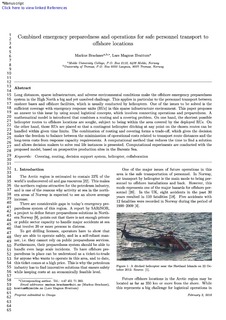Combined emergency preparedness and operations for safe personnel transport to offshore locations
Journal article, Peer reviewed
Accepted version

View/
Date
2016Metadata
Show full item recordCollections
- Artikler [377]
- Publikasjoner fra Cristin [393]
Original version
Omega : The International Journal of Management Science. 2016, 67 (March), 31-41. 10.1016/j.omega.2016.03.006Abstract
Long distances, sparse infrastructure, and adverse environmental conditions make the offshore emergency preparedness system in the High North a big and yet unsolved challenge. This applies in particular to the personnel transport between onshore bases and offshore facilities, which is usually conducted by helicopters. One of the issues to be solved is the sufficient coverage with emergency response units (RUs) in this sparse infrastructure environment. This paper proposes an answer to this issue by using sound logistical concepts, which involves connecting operations and preparedness. A mathematical model is introduced that combines a routing and a covering problem. On one hand, the shortest possible helicopter routes to offshore locations are sought, subject to being within the area covered by the deployed RUs. On the other hand, those RUs are placed so that a contingent helicopter ditching at any point on the chosen routes can be handled within given time limits. The combination of routing and covering forms a trade-off, which gives the decision maker the freedom to balance between the minimization of operational costs related to transport route distances and the long-term costs from response capacity requirements. A computational method that reduces the time to find a solution and allows decision makers to solve real life instances is presented. Computational experiments are conducted with the proposed model, based on prospective production sites in the Barents Sea. Keywords: Covering; Routing; Decision support system; Helicopter; Collaboration.
